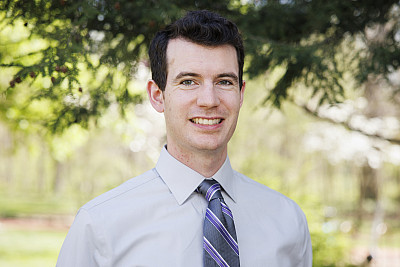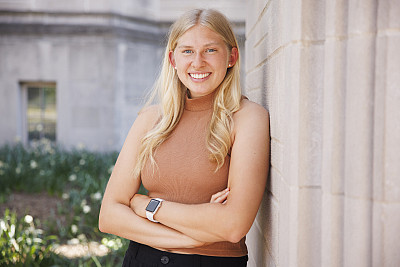Student commencement speakers to share about the power of mistakes
By Emily Miles
April 23, 2024
Two students with converging messages will take the podium to address their fellow graduates at their respective Indiana University Bloomington commencement ceremonies.
Patrick Blackstone, who is earning a doctorate in physics, will speak about what we can learn from being wrong during the spring graduate commencement at 3 p.m. May 3 in Simon Skjodt Assembly Hall.
Hannah Pedersen, a biology major, will speak about the importance of coming together and taking risks at the spring undergraduate commencement at 7 p.m. May 4 at Memorial Stadium.
IU Bloomington is awarding 9,943 degrees to graduate and undergraduate students this spring.
‘The liberation of being wrong’
Blackstone, from Waterville, Maine, is receiving his doctorate in elementary particle physics after earning bachelor’s degrees in mathematics and physics from Bowdoin College.
Blackstone has long maintained a penchant for working quietly with mathematical puzzles. During a childhood summer, he spent a week writing out decimals in pursuit of the square root of three. Dedicated, he found himself wrong many times before learning that the digits never ended.

“Rather than hearing that and feeling paranoia that I might be wrong all the time, it felt very liberating,” Blackstone said. “It’s a good thing to be wrong, because that’s just the first step toward trying to develop a better model.”
After attending a high school specializing in math and science, it was during his undergrad years that Blackstone first acknowledged the joy and benefits of academic community. He was drawn to the enthusiastically collaborative physics department, solidifying the direction of his study.
During a visit in the abundance of a Hoosier spring, he found the IU Bloomington campus flowers charming and the faculty captivating. And, ultimately, as he contemplated other schools in major cities for his doctoral destination, he imagined Indiana would be boring enough not to distract him from his studies.
He was wrong — and pleasantly surprised.
Homesick for Maine and approaching physics burnout, Blackstone sought activities to remind him of New England and dipped his toe into contra dance. He took a pause during the pandemic and then rejoined — this time with a mandolin, for which he secured a university fellowship that supported lessons and a higher-quality instrument. Since then, he has deepened his involvement in the Bloomington folk music scene and cultivated a sense of community.
On campus, Blackstone worked on a variety of research projects that stretched his skills, and he found fulfillment through teaching classes of diverse students — ones whose keen curiosity manifested in questions about applying physics to mass spectrometry, astronomy and biomechanics.
Blackstone has observed that people tend to talk about how science proves things. He contends that, on the contrary, the foundation of the scientific method is that we’re never proving anything.
“What we’re doing is coming up with a theory or a model, and then trying as hard as possible to prove that it’s wrong,” Blackstone said. “And then the extent to which the model or the scientific idea is successful is just a measure of how well you tried and successfully failed at proving it wrong.”
That is the message, amid gratitude and humor, that he plans to offer to fellow graduates.
In his final semester, Blackstone received a job offer to stay in southern Indiana, using his expertise to improve the stability of small electrical components in machinery. Having assumed he would remain in the academy after graduation, Blackstone said he is once again proven wrong and pleasantly surprised.
“The more I reflect on the idea of leaving academia, at least for now, it seems very much like the right choice to get some perspective and space,” Blackstone said, suggesting that experience in industry bears high potential to challenge and expand his research and teaching skills.
Risk and reward
Pedersen, from Carmel, Indiana, has long had clear sights on her goals. After a childhood of experiencing dental anxiety, she knew she wanted to become a dentist, helping people feel safe in caring for their oral health.
Similarly, there was little question about where to study. Her father attended IU, and she was familiar with the quality of the IU School of Dentistry. She visited a range of universities, but only one felt like home.

That year, Pedersen often donned two masks in the early morning so she could settle into a Forest Quad lobby — where she wouldn’t wake her roommate — and meet via Zoom with her pre-dental academic advisor.
“I was so eager to learn about the path ahead of me to reach my goals, and my advisor was all in,” Pedersen said. “He answered all my questions, and he cared so deeply that I wanted to pursue dentistry for the right reasons.”
Through these meetings, Pedersen came to understand her motivations more fully. She resolved, with the support of her advisors, mentors and friends — and the acronymic wisdom of her grandmother — that she would take RISKs.
“R stands for risks — challenges to meet, not excuses for quitting.”
Pedersen dove into coursework, maintaining high standards and seeking value in academics. Slowly, she noticed a pattern that was not working for her.
“If I did not like my grade, I wasn’t in a great place mentally,” Pedersen said. “And that’s something that I’ve had to overcome. It’s been really difficult, but I’ve learned that, through dips in grades and GPAs, on the other side, everything will be okay, because your value is not in your academics.”
Pedersen took the risk of being gentle with herself, and it paid off in improved well-being and greater capacity to connect with community.
“I stands for the inspirations in your life which drive you to accomplish anything you set your mind to.”
Throughout her four years, Pedersen nurtured her faith with Chi Alpha Christian Fellowship and developed leadership skills in Dental Club. She served people with Alzheimer’s through the Brain Exercise Initiative, worked alongside chemistry professors as a teaching assistant and co-founded IU’s first and only pre-dental fraternity, Delta Theta Omega. All the while, she interned at a pediatric dentistry.
She emphasized how she benefited from creating community with people who held similar priorities and values. Alongside friends and colleagues who were dedicated to taking care of the Bloomington community and one another, she could give and receive the greatest degree of support.
“That’s been a huge part of my time at IU, being able to build those connections,” Pedersen said. “And they’re going to be my friends for the rest of my life.”
Pedersen also enjoys working out, playing violin, creating pottery, and going for spontaneous Bruster’s ice cream runs with friends.
“S stands for the smart that you are.”
Recognizing that she was growing distracted and stressed about her coursework and dental school applications, Pedersen decided she needed a creative outlet. The result?
She published a children’s book called “Will I Survive the Dentist?” and now visits schools to help children become more familiar with proper oral hygiene and dental visits.
“Being able to share this story with the community and have that as a resource for families and kids and whoever is experiencing dental anxiety brings me so much joy,” Pedersen said.
“And K stands for keeping focus on your end goal.”
In the fall, Pedersen plans to attend the IU School of Dentistry, further exploring the profession while embracing mistakes along the way.
“Mistakes — and failures — are opportunities to grow,” Pedersen will offer in her speech. “If you never made a mistake, did you take any risks?”
Emily Miles is a campus engagement generalist in the Office of the Provost.